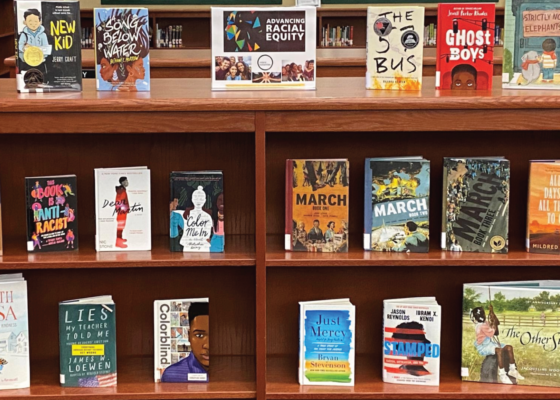5 Things We Learned from Tess Gunty
July 31, 2023On July 17, 2023, we held an INconversation with Tess Gunty at Indiana Landmarks. Gunty is the author of The Rabbit Hutch, her National Book Award-winning debut novel about the…
On July 17, 2023, we held an INconversation with Tess Gunty at Indiana Landmarks. Gunty is the author of The Rabbit Hutch, her National Book Award-winning debut novel about the fictional town of Vacca Vale, which was based in part on her hometown of South Bend. We’re grateful to Tess and moderator Susan Neville, author and Butler University professor emerita, for sharing their thoughts about the writing process, hope, technological addiction by design and the power of fiction.
As we like to do at Indiana Humanities, we’ve recapped the conversation below with “5 Things We Learned.” Here are some moments that stood out to us:
1. How The Rabbit Hutch came to be. Neville was curious about Gunty’s writing process, and asked about the creation of the novel she referred to as “complex, very smart and very rich.” When Gunty began the book, she had just moved to New York from South Bend. “I was drawn to the post-industrial Midwest at that time,” Gunty said. “I couldn’t write anything that wasn’t pulled back there.” For the fictional town of Vacca Vale, she was inspired by her hometown, but also by Gary, Ind., Youngstown, Ohio and Flint, Mich. To populate her town, the character of Joan came to her first, and from there “every character introduced me to the next.” In hindsight, it wasn’t the most efficient way to write. “I ended up deleting a lot of pages, but it was the only way I could have made that book.” The process took five years all told.
2. Blandine and the mystics. The memorable character of Blandine is not religious, but yet enthralled by mysticism. This reflects Gunty’s interest in the medieval female mystics she encountered during her Catholic education. She was attracted to the blend of magic, witches, the supernatural and wild, animalistic imagery. Thinking back, Gunty suspects she was so interested in this because there were so few powerful female figures to look up to in the religion. In Blandine’s favorite mystic — Hildegard von Bingen — the character sees “a full retreat from material accumulation, [the extraction economy] value system and a return to nature.” She also sees a path to freedom. “It’s the one form of escape that doesn’t require any material resources,” Gunty said. “She doesn’t need any money. She’s someone who doesn’t have a high school education. She doesn’t have any connections or family. She has no hope of escaping in any conventional way. But she can escape. She can imagine escaping, using her mind, because her mind has always been a place of refuge for her.”
3. Post-industrial orphans. Neville noted a deep sense of abandonment in the novel, with characters who are both literally and figuratively orphaned and left to navigate the declining urban landscape on their own. Gunty extended this to what she sees as generational disconnects. “Newer generations are feeling like they’ve been abandoned by older generations. And I see this especially in Gen Z. I’m a Millennial, and I think we have a bit of that, but with Gen Z, I can see this absolute rage,” she said. They are grappling with an “environmental crisis, gun control, economic devastation” and coming of age during a pandemic.
4. The great distraction. Gunty does not have a social media presence and is wary of technology’s ulterior motive. “Technology isn’t neutral. It’s not a stove. It wants something from you,” she said. “There are experts employed to change the way you think, to change the chemicals that were released in your brain and to make you addicted to these platforms and then ultimately sell you things. To tell you who to vote for.” While not dismissing all of technology’s benefits, Gunty maintains that we shouldn’t drop our guard. Our attention is valuable — a sacred resource. “We should be vigilant.” Many of the characters in The Rabbit Hutch are also suffering from an inability to focus because of the Internet and television.
5. Powerful pages. Books have a tremendous ability to conjure empathy for others in their readers. Gunty referenced The Haunting of Hajji Hotak and Other Stories by Jamil Jan Kochai as a recent read that helped her step into the lives of others. “It’s this really rare opportunity to swim in someone else’s psychology. … When I’m reading this book, I get to experience these people’s inner lives, and it’s a reality that’s withheld from me by the limitations of my own identity. So it’s impossible to emerge from a book like that without a changed perspective on other people, or without more tenderness toward them, without more understanding and compassion.” This brought her thoughts to book bans that are emerging across the country. “Books have an incredible power to change people’s hearts and minds,” Gunty said. “People wouldn’t be so afraid of it otherwise.”
You can view photos from last night’s event here.
This INconversation was held in partnership with the Indiana State Library’s Center for the Book. This event coincides with the paperback release of “The Rabbit Hutch” and the upcoming National Book Festival. The novel has been selected by the Indiana Center for the Book as the state’s 2023 contribution to the Library of Congress’s Great Reads from Great Places program held at the Festival. Book sales were provided by Tomorrow Bookstore.



